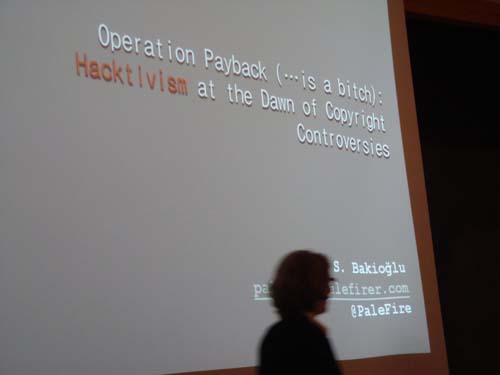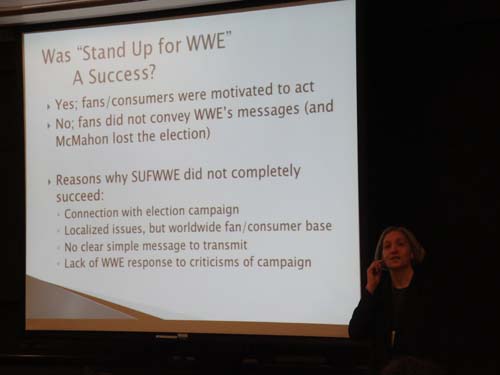Forum 3: Power and Empowerment (panel questions)
Sandra Braman, University of Wisconsin, Milwaukee
Giuliana Cucinelli, Concordia University
Richard Rogers, University of Amsterdam
Moderator: William Uricchio, MIT
Forum 3: Power and Empowerment (panel questions)
Sandra Braman, University of Wisconsin, Milwaukee
Giuliana Cucinelli, Concordia University
Richard Rogers, University of Amsterdam
Moderator: William Uricchio, MIT
 Pirates session
Pirates session
Burcu Bakioglu, Operation Payback (…is a Bitch): Hacktivism at the dawn of Copyright Controversies
Bodo Balasz, Informal Media Economies – What Can We Learn from the Pirates of Yesteryear?
Martin Fredriksson, The Ideology of Piracy and the Public Spheres of Modernity
Jinying Li, Piracy, Circulation, and Cultural Control in Cyber-Age China
moderator: Marcienne Martin
Unfortunately I was able to attend only the talk by Bakioglu.
Speakers:Frank Marchese, Pace Digital Gallery, Julia Noordegraaf University of Amsterdam, Jason Rhody, Office of Digital Humanities, NEH. Moderator: Nick Monfort, MIT
Session was basically about how to present literature, art and whatever is or is not archived already – in such a way that it becomes archivable. There is always a need to archive and preserve. Read More …
New Platforms for Education
Andrea Mangiatordi et al, Facebook Influence on University Students’ Media Habits
Mary Leigh Morbey, Metamedia Immersive Environments: Transitions in Digital Learning
Andi Sciacca, The Digital Kitchen
Young Song, Lisa Donovan, Kristina Sansone, Multiple Layers of Learning through Digital Transition: VoiceThread
moderator: Chris Gerben
Mangiatordi: frivolous content is the norm. It is seen as a sort of strategy to protect privacy. Use of facebook is mainly instrumental: used to orchestrate face-to-face hangouts. Students tend to deprecate it, mostly for contents and private issues [but web 2.0 is all about sharing, above all, are our students being too serious?]. Media platforms have swithced: students appear to be very savvy in finding the entertainment they want. Digital skills are not so common: many of the interviews saw themselves as digital immigrants. So what? Facebook didn’t probably change the habits. It most likely changed interpersonal communications quantitatively. Redefining other media or formats uses. Read More …
 Fiona McQuarrie: Can social media mobilize audiences and consumers for non-commercial purposes?
Fiona McQuarrie: Can social media mobilize audiences and consumers for non-commercial purposes?
Social media promoted as a way to create new relationship between producer and consumer. It looks at building relationships and creating consumer motivation to buy/use produce.
Business and social media use:
What difference does it make if they use it or not? There are four existing research: